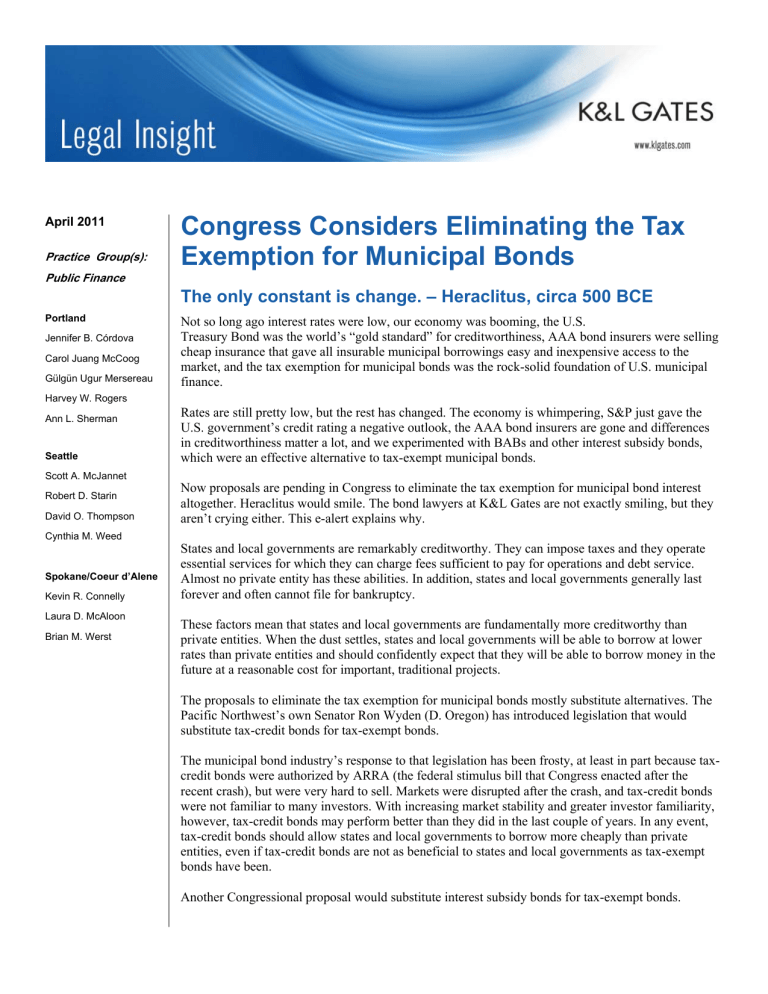Congress Considers Eliminating the Tax Exemption for Municipal Bonds

April 2011
Practice Group(s):
Public Finance
Portland
Jennifer B. Córdova
Carol Juang McCoog
Gülgün Ugur Mersereau
Harvey W. Rogers
Ann L. Sherman
Seattle
Scott A. McJannet
Robert D. Starin
David O. Thompson
Cynthia M. Weed
Spokane/Coeur d’Alene
Kevin R. Connelly
Laura D. McAloon
Brian M. Werst
Congress Considers Eliminating the Tax
Exemption for Municipal Bonds
The only constant is change. – Heraclitus, circa 500 BCE
Not so long ago interest rates were low, our economy was booming, the U.S.
Treasury Bond was the world’s “gold standard” for creditworthiness, AAA bond insurers were selling cheap insurance that gave all insurable municipal borrowings easy and inexpensive access to the market, and the tax exemption for municipal bonds was the rock-solid foundation of U.S. municipal finance.
Rates are still pretty low, but the rest has changed. The economy is whimpering, S&P just gave the
U.S. government’s credit rating a negative outlook, the AAA bond insurers are gone and differences in creditworthiness matter a lot, and we experimented with BABs and other interest subsidy bonds, which were an effective alternative to tax-exempt municipal bonds.
Now proposals are pending in Congress to eliminate the tax exemption for municipal bond interest altogether. Heraclitus would smile. The bond lawyers at K&L Gates are not exactly smiling, but they aren’t crying either. This e-alert explains why.
States and local governments are remarkably creditworthy. They can impose taxes and they operate essential services for which they can charge fees sufficient to pay for operations and debt service.
Almost no private entity has these abilities. In addition, states and local governments generally last forever and often cannot file for bankruptcy.
These factors mean that states and local governments are fundamentally more creditworthy than private entities. When the dust settles, states and local governments will be able to borrow at lower rates than private entities and should confidently expect that they will be able to borrow money in the future at a reasonable cost for important, traditional projects.
The proposals to eliminate the tax exemption for municipal bonds mostly substitute alternatives. The
Pacific Northwest’s own Senator Ron Wyden (D. Oregon) has introduced legislation that would substitute tax-credit bonds for tax-exempt bonds.
The municipal bond industry’s response to that legislation has been frosty, at least in part because taxcredit bonds were authorized by ARRA (the federal stimulus bill that Congress enacted after the recent crash), but were very hard to sell. Markets were disrupted after the crash, and tax-credit bonds were not familiar to many investors. With increasing market stability and greater investor familiarity, however, tax-credit bonds may perform better than they did in the last couple of years. In any event, tax-credit bonds should allow states and local governments to borrow more cheaply than private entities, even if tax-credit bonds are not as beneficial to states and local governments as tax-exempt bonds have been.
Another Congressional proposal would substitute interest subsidy bonds for tax-exempt bonds.
Congress Considers Eliminating the Tax Exemption for
Municipal Bonds
Interest subsidy bonds (like the Build America Bonds that could be issued in 2009 and 2010) did work. At a 35% subsidy level, they often allowed states and local governments to borrow at lower cost than traditional tax-exempt bonds. If Congress substitutes interest subsidy bonds for tax-exempt bonds, the effect on states and local governments will likely depend entirely on the level of interest subsidy. At a 35% subsidy, states and local governments could be better off. At lower subsidy levels, they could be worse off. But almost any level of interest subsidy should allow states and local governments to borrow more cheaply than they could with ordinary, taxable bonds.
Although a total elimination of tax-exempt bonds would increase state and local government borrowing costs, it is important to remember two things: (1) the arbitrage, private activity bond and other IRS restrictions on the use of proceeds of tax-exempt bonds have grown increasingly burdensome, and (2) the savings from tax-exempt bonds have been shrinking.
If Congress does take the tax exemption away from states and local governments, it will not only remove substantial compliance burdens, but it may create genuine opportunities for economically beneficial “public-private partnerships.” Many true public private partnership opportunities are prohibited by the private activity bond restrictions that come with tax-exempt bonds. If we lose the tax exemption for state and local government bonds, we expect to develop alternatives that allow governments to provide services to their citizens in new ways, and at a lower cost than those services can be provided by any other entity.
And that is why the bond lawyers at K&L Gates are not crying about the potential loss of the tax exemption for state and local government bonds.
Any of the following bond lawyers would be happy to talk to you about current opportunities for taxexempt and taxable financing, and also about how we all might cope as the world continues to change.
2






